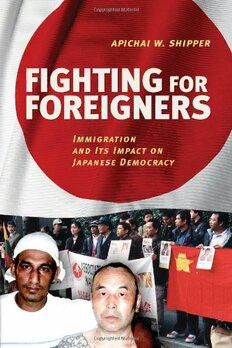
Fighting for Foreigners: Immigration and Its Impact on Japanese Democracy PDF
Preview Fighting for Foreigners: Immigration and Its Impact on Japanese Democracy
Fighting for Foreigners Fighting for Foreigners Immigration and Its Impact on Japanese Democracy Apichai W. Shipper Cornell University Press Ithaca and London Cornell University Press gratefully acknowledges receipt of a subvention from the University of Southern California, which helped in the publication of this book. Copyright © 2008 by Cornell University All rights reserved. Except for brief quotations in a review, this book, or parts thereof, must not be reproduced in any form without permission in writing from the publisher. For information, address Cornell University Press, Sage House, 512 East State Street, Ithaca, New York 14850. First published 2008 by Cornell University Press Printed in the United States of America Library of Congress Cataloging-in-Publication Data Shipper, Apichai W. (Apichai Wongsod), 1968– Fighting for foreigners : immigration and its impact on Japanese democracy / Apichai W. Shipper. p. cm. Includes bibliographical references and index. ISBN 978–0–8014–4715–0 (cloth : alk. paper) 1. Immigrants—Japan—Political activity. 2. Aliens—Japan—Political activity. 3. Illegal aliens—Japan—Political activity. 4. Alien labor— Japan. 5. Japan—Emigration and immigration—Government policy. 6. Emigration and immigration law—Japan. 7. Democracy—Japan. I. Title. DS832.7.A1S55 2008 320.952—dc22 2008015708 Cornell University Press strives to use environmentally responsible suppliers and materials to the fullest extent possible in the publishing of its books. Such materials include vegetable-based, low-VOC inks and acid-free papers that are recycled, totally chlorine-free, or partly composed of nonwood fi bers. For further information, visit our website at www. cornellpress.cornell.edu. Cloth printing 10 9 8 7 6 5 4 3 2 1 For my parents, Ranoo and Sander Shipper Contents Preface ix Abbreviations xiii Note on Conventions xvii 1. Introduction: Associative Activism 1 2. Controlling Foreigners: Japan’s Foreign Worker Policy 25 3. Long-Distance Nationalism: Political Activities of Immigrant Ethnic Associations 59 4. Democracy of Illegals: Organizing Support for Illegal Foreigners 88 5. Local Partners: Local Governments and Immigrant Rights NGOs 128 6. Foreigners in the Public Sphere: Contesting Prevalent Social Meanings 156 viii Contents 7. Conclusion: Foreigners and Democracy 188 Appendix 203 Index 207 Preface At the beginning of the third millennium, the development of capi- talism has reached a point where capital, ideas, and people move readily across national boundaries. Globalization, as this stage of capitalism is now called, poses a challenge for many thinkers in the new millennium. It chal- lenges us not only to understand how globalization positively or negatively affects societies but also to fi nd imaginative rules and institutions to ensure that globalization works justly for those 200 million people who live and work in a country other than the one they were born in. Japanese capital- ism, which is known for its innovative business practices and institutions, can be expected to offer new ideas on such rules and institutions to students of comparative immigration politics. This book explores Japan’s immigra- tion laws and institutions and their impact on its democracy. This project originated at Massachusetts Institute of Technology (MIT) where I received my graduate training. I greatly appreciate the guidance of my thesis committee: Richard Samuels, Michael Piore, Benedict Ander- son (from Cornell), and the late Myron Weiner. They have shown me a x Preface path to my becoming a committed scholar as well as a caring teacher and a decent human being. Loren King and Robert Pekkanen, whose academic paths crossed mine in Cambridge, have witnessed and deeply infl uenced the development of this project, both theoretically and empirically, from its initial stage to the fi nal product. They tirelessly offered critical, new chal- lenges to my idea, and I cherish our long friendship and their continued intellectual support. I also benefi ted greatly from scholars who have read and commented on portions of this book in earlier forms. I would like to thank John Dower, David Gartner, Andrew Gordon, Norma Field, Wolfgang Herbert, Hi- guchi Naoto, Peter Hill, Horiuchi Yusaku, the late Kajita Takamichi, An- thony Kammas, Hyung Gu Lynn, Peter Nosco, Susan Pharr, T. J. Pempel, Kim Reimann, Frank Schwartz, Jefferey Sellers, Tanno Kiyoto, Tsujinaka Yutaka, Tsunekawa Kei’ichi, and Watanabe Hiroaki. I am also grateful to the two anonymous reviewers for helpful comments on earlier versions and appreciate the enthusiasm and professionalism of Roger Haydon of Cor- nell University Press. Finally, I thank Barbara Gartner and Ange Romeo- Hall for helping to improve the writing of the manuscript. I acknowledge the fi nancial and institutional support from the United Nations University Institute of Advanced Studies, the Matsushita Inter- national Foundation, the University of Tokyo Institute of Social Science, the Hitotsubashi University Department of Social Studies, the Harvard– MIT MacArthur Fellowship on Transnational Security, the MIT Indus- trial Performance Center, the Harvard University Program on U.S.–Japan Relations, the Japan Foundation, and the University of Southern Cali- fornia (USC) Center for International Studies. I am grateful to the USC Department of Political Science and the School of International Relations for providing me with great research assistants: Jeany Choi, Christine Jun, Nadejda Marinova, Abigail Ruane, and Laura Sjoberg. Part of this book draws from my earlier work: “Criminals or Victims? The Politics of Illegal Foreigners in Japan,” reprinted by permission of Journal of Japanese Studies 31, no. 2 (2005): 299–327; and “Foreigners and Civil Society in Japan,” reprinted by permission of Pacifi c Affairs 79, no. 2 (2006): 269–289. I owe a great debt to the foreigners, social activists, and government of- fi cials with whom I have interacted over the years. They have been gener- ous in sharing time, stories, ideas, and documents with me.
